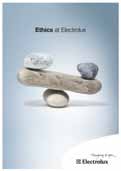
Case study (SO2-8): Shared values and integrity
With a staff of some 50,000 and a presence in 50 countries, it is vital that high ethical standards are applied wherever Electrolux operates in the world, and are understood by all its employees. The newly launched Ethics at Electrolux program is designed to inform employees of the company's expectations for personal and corporate ethical accountability.
Click here to find out more.
In addition to the ALFA tool, the internal auditing group, Management Assurance and Special Assignments, which reports its findings to the Board of Directors, conduct regular audits of internal operations on Group Codes and Policies.
During 2010, workshops on the guidelines for gifts and events were held for selected functions and content of these guidelines were integrated into an e-learning program in the US.
An ethics program was developed to enhance employee understanding of Group expectations for personal and corporate ethical accountability, including anti-corruption. Translated into 12 languages, Ethics at Electrolux comprises a guidebook, and an intranet site with additional information about relevant policies and guidelines and other ethics and compliance matters. It also includes a mandatory e-learning ethics training module. Roll-out of the ethics program is scheduled to begin in 2011.
Employees who violate a Group Policy may be subject to disciplinary action, up to and including dismissal, depending on the facts and circumstances.
Public policy
Electrolux has adopted formal policy positions on, for the Group, core strategic issues such as supporting market incentives that trigger change in consumer purchasing.
Public policy initiatives are primarily coordinated with industry organizations such as the European Appliance Industry Association (CECED) and the American Home Appliance Manufacturers Association (AHAM). Public policy issues relevant to Electrolux include climate change, energy efficiency, producer responsibility for recycling, product responsibility, labeling, harmonization of legislation such as chemicals use. Since performance standards and legislation vary between countries Electrolux supports their global harmonization.
There are no significant differences between the Group’s lobbying positions and the policies of Electrolux, its sustainability goals or other public positions.
Electrolux does not make political contributions, including donations to politicians or political parties. Employees who engage in dialogue with governments and other public bodies to inform or influence public policy must do so responsibly and transparently, making it clear at all times that they represent Electrolux.
Compliance
Potential non-compliance, disputes or items that pose a material financial risk are reported to Group level in accordance with Group policy. No such significant item was reported in 2010.
